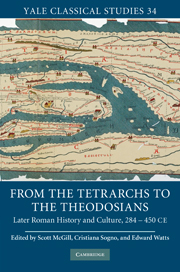Book contents
- Frontmatter
- Contents
- Acknowledgments
- Introduction
- PART I POLITICS, LAW, AND SOCIETY
- PART II BIOGRAPHY AND PANEGYRICS
- 6 Three generations of Christian philosophical biography
- 7 The education of Paulinus of Pella: learning in the late empire
- 8 Another man's miracles: recasting Aelius Donatus in Phocas's Life of Virgil
- 9 Gregory of Nazianzus's Life of Julian revisited (Or. 4 and 5): the art of governance by invective
- PART III FACES OF THEODOSIUS I
- References
- Index
7 - The education of Paulinus of Pella: learning in the late empire
from PART II - BIOGRAPHY AND PANEGYRICS
Published online by Cambridge University Press: 04 August 2010
- Frontmatter
- Contents
- Acknowledgments
- Introduction
- PART I POLITICS, LAW, AND SOCIETY
- PART II BIOGRAPHY AND PANEGYRICS
- 6 Three generations of Christian philosophical biography
- 7 The education of Paulinus of Pella: learning in the late empire
- 8 Another man's miracles: recasting Aelius Donatus in Phocas's Life of Virgil
- 9 Gregory of Nazianzus's Life of Julian revisited (Or. 4 and 5): the art of governance by invective
- PART III FACES OF THEODOSIUS I
- References
- Index
Summary
A hallmark of John Matthews's first book, Western Aristocracies and Imperial Court, is a fine appreciation of the Latin literature of the age not only as a window onto the world of late antique aristocrats but also as an artifact of their ease. We encounter Symmachus celebrating in a letter Ausonius's new masterpiece, the Mosella, “pick[ing] out for special mention that part of the poem which might to our tastes seem the most unsympathetic, the resourceful ‘Catalogue of Fishes’ – where, said Symmachus, were listed more varieties of fish than he had ever seen at Ausonius' table!” (A footnote duly notes, “At Mosella 131 f., Ausonius pays tribute to the gudgeon, not a culinary delicacy.”) We encounter, too, Ausonius and the emperor Valentinian himself, in friendly rivalry (or so Ausonius says) stitching together wedding poems from lines of Virgil, Ausonius's half of the exchange surviving in his Cento nuptialis – “in its concluding section, a hilariously indecent example of the art of quoting out of context.” Yet the characteristic touches of humor here point to a most important theme of Matthews's work on this period and a lesson he offers to all historians: political history cannot be fully understood without an awareness of cultural and social history; both the “public” and “private” lives of a ruling class have to be kept in balance; otium matters as well as office.
- Type
- Chapter
- Information
- From the Tetrarchs to the TheodosiansLater Roman History and Culture, 284–450 CE, pp. 135 - 152Publisher: Cambridge University PressPrint publication year: 2010



